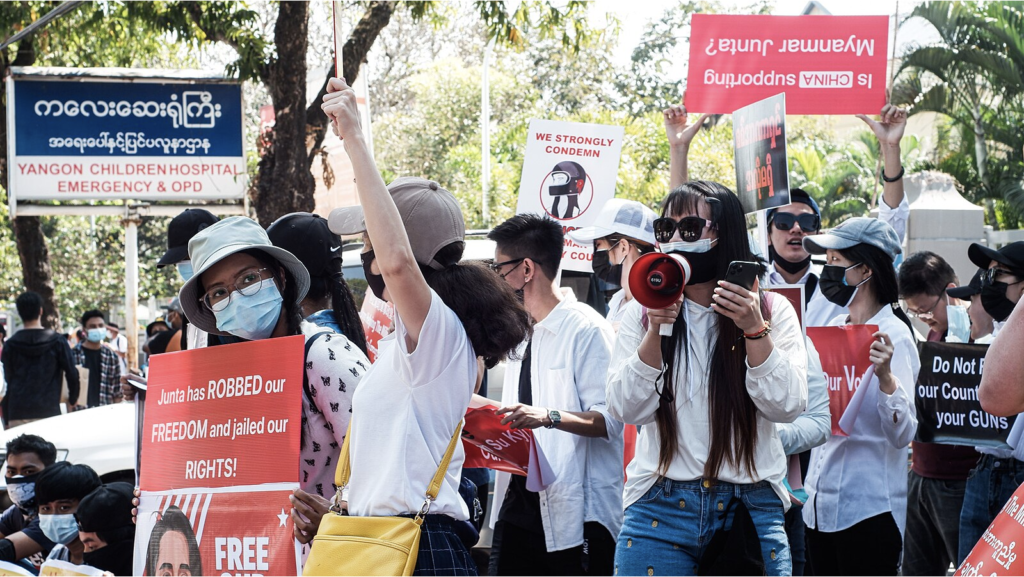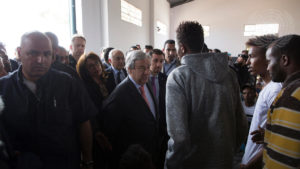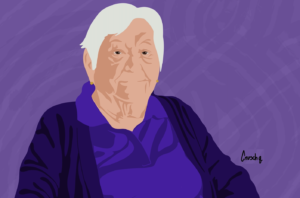Since the 2021 coup in Myanmar, young activists have led the resistance movement, differing from previous generations in their approach to ethnic minorities. Hnin Thet Hmu Khin, a humanitarian and activist from Yangon, shared her experiences in the youth movement and her hopes for the future of Myanmar.

Could you discuss the resistance movement and the post-2021 coup events? How did you, as a young person, decide to join the youth movement?
My generation, including those a bit younger than me, witnessed the country opening up from 2010, fostering our hopes and dreams. We anticipated a lasting opening after years of closure, allowing us to explore the world. Personally, I received a scholarship to the US, and many of my peers traveled abroad for the first time and were able to participate in the 2020 election.
However, on February 1, 2021, everything changed, plunging us back to square one. The loss was profound for my generation, which had tasted a bit of freedom. In contrast, older generations, raised during times of closed borders, had lived under such a regime before.
We were curious about your journey into protesting. What actions did you take post-coup?
I already had friends in the NGO and activist crowds, so I was able to gather more than a hundred people on a group chat on Signal. On the second day, we distributed posters and garnered media attention. By the sixth day in Yangon, we joined the streets with the General Strike Committee of Nationalities, which includes a lot of people of non-Bamar ethnicities.
We were communicating with the Milk Tea Alliance, a network of activists from Thailand, Hong Kong, Taiwan, and Myanmar. We sought guidance from the Hong Kong Team who gave us a manual on how to protect yourself as a protestor and how to organize the protests. Equipped with helmets and tear gas masks, we formed a defense team with shields.
Unfortunately, we could only follow the Hong Kong manual for a few days before the military started shooting us and throwing hand grenades. Recognizing the escalating threat, some collaborators shifted to armed groups from March 2021.
Are you comfortable talking a little bit more about the armed struggle?
Very little action was taken by the UN apart from a few statements and closed-door meetings. Everyone in Myanmar had the hope R2P would be invoked and help the country but nothing happened.
After a certain point, people felt the need to defend themselves and started taking up arms. Personally, I have not embarked on the path of armed struggle yet, but I understand why people have done so and I share the same feelings as them. The international community failed to protect us even when our plight was broadcasted in front of international media.
Many individuals outside Myanmar struggle to comprehend our resort to violence, often asserting that it is not the solution. In response, I would say that none of us choose war, we all want to live a peaceful life, there are no other means for us.
While some people are still peacefully protesting, they are only a small group. We feel that if we do not resist right now, the country is going to evolve like North Korea, or other countries where populations are living in the dark. Our struggle today is not merely for ourselves but for future generations. We are fighting the same struggle as in 1988. We feel the need to invest in everything we have.
International sources show that the military does not control all the territory. How have the people been resisting their expansion?
Even when the military has control over an area, it cannot subdue the people within. The majority opposes military rule. While not everyone is taking up arms, many are still resisting by supporting the Liberation Army or making donations. Various forms of resistance exist beyond armed struggle. If this collective effort endures, it is like a fire that cannot be shut down. As long as it persists, we maintain the potential to triumph in the revolution down the road.
What sort of aid would you most appreciate from the international community?
There are still parts of the country where humanitarian aid cannot reach. Life-saving humanitarian assistance is crucial as many people are facing starvation. In certain areas of Myanmar, the military has shut down the internet. We appeal to the international community to supply us with Starlink connections, similar to those currently available in Ukraine.
The most important thing is to withhold legitimacy from the military and those responsible for bloodshed. A global arms embargo could be considered, as we have been talking about for a long time.
Could you talk a little more about the internet blackouts?
The military has employed the ‘Four Cuts’ strategy, aiming at disrupting the supply of food, funds, information, and recruits. Consequently, the internet has been severed in various locations, hindering people from accessing information about the situation on the ground and the data on casualties. The internet plays a crucial role in the revolution and has nearly become a human right.
One of the distinctive aspects that sets the youth apart from the 1988 generation is their engagement in the digital revolution. When the military restricted internet access, individuals began devising strategies to overcome these limitations. Even now, utilizing a VPN is needed to connect to platforms like Google, Facebook, and other foreign websites. We also use digital methods, such as click-to-donate, to support the revolution. We have something called the Blood Money Campaign, which exposes the businesses helping the military. All these initiatives depend on the internet, which is why it is so important right now. Moreover, people abroad need to communicate with those on the ground.
You mentioned that the youth has been approaching things differently compared to the previous generation. Could you elaborate on your relationship with ethnic minorities, particularly the Rohingyas?
Personally, I worked in Rakhine state in 2017 during the height of the crisis. I oversaw a humanitarian project and collaborated extensively with the Rohingyas, many of whom were my colleagues.
In a broader context, one thing that this revolution has changed is perception of Rohingyas and ethnic minorities among people of Bamar ethnicity. Before the coup, most of the Bamar population believed the struggles of ethnic minorities were unrelated to them and remained largely ignorant, despite the civil war persisting for over 70 years. When the military’s actions were broadcasted internationally, depicting the shooting of people, people realized that if such atrocities could be committed against the Bamar majority, even worse must have occurred to the Rohingyas in areas where there is no media, no internet. This realization built a connection between the Rohingyas, other ethnic minorities, and the Bamar majority.
This is a positive outcome of the revolution; it opened the eyes of many young people who realized that we are all collectively facing these challenges.
Even if you are residing outside of Myanmar, do you fear for your safety, and what types of security threats do you encounter?
When I was still in Myanmar, my sense of insecurity was a lot worse than now. When I first got out of the country, the sound of explosions triggered an immediate instinct to run, a reflex developed from the constant need to evade. This fear stayed with me to this day, I still have nightmares about being in Myanmar and having run for my life.
Military-backed Telegram channels and Facebook accounts are often intruding into my posts and discussions because I often host panels. They have sent me many deaths threat and have said that they will send Muslim men to rape me as retaliation for my advocacy for the Rohingyas in 2017.
What are you hopes for the future of Myanmar?
I believe that as long as we carry that fire within us, the resistance will persist. Every individual in Myanmar who has witnessed the violence and atrocities perpetrated by the military will retain those memories, no matter where they are in the world. As long as this collective memory endures, I am confident that, eventually, we will win the revolution. The victory may not be today or tomorrow—but when it happens, we will be able to release the pain that we have been holding onto. When we win the revolution, we will be able to cry peacefully. I am really hoping for that day.
We share in the hope for that day as well. Is there anything else you would like to add?
I will just add a little bit about the difference between young people and older people. Traditionally, because Myanmar is a very male-dominated society, there is a deep respect for the elders and the belief that wisdom comes with age. The country’s institutions, whether governmental, related to the National League for Democracy (NLD), or within the military, have consistently been led by older Burmese men. However, with the onset of protests and armed struggles, a realization has emerged that younger people, equipped with modern education and access to information in the digital age, possess valuable wisdom. Growing up in the era of social media has enabled us to learn from peers globally, as seen in movements like the Milk Tea Alliance. This, in turn, has been beneficial not only in the realm of the digital revolution but also in armed struggles, where creativity plays a crucial role.
Nevertheless, a notable drawback of the revolution and these generational shifts is the brain drain. Individuals like me and many others, who could contribute to the country’s development, now find ourselves outside of Myanmar. We are channeling our efforts into supporting countries like Australia, rather than contributing to the progress of Myanmar.
The content of this interview does not necessarily reflect the views of United Against Inhumanity or any of its other members.











